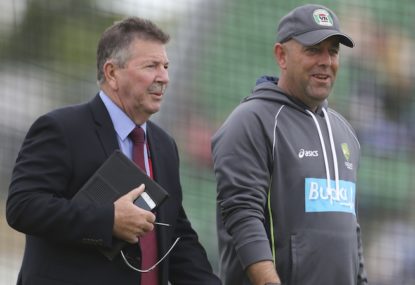Australia’s capitulation in this Ashes series should remind the visitors of the work they need to do to become consistently competitive overseas. It should not, however, lead to panicked actions.
In the wake of Australia’s meek handing back of the Ashes, we have had several knee-jerk reactions from former players, pundits and cricket followers.
Ricky Ponting said the English Dukes ball must be used in Australia’s domestic cricket. Ian Chappell has stated that the domestic system should be revamped.
Australian fans have called for everything from English-style pitches in the Sheffield Shield to firing coach Darren Lehmann to dropping gifted incumbent players Nathan Lyon, Josh Hazlewood and Mitchell Starc.
Using the Dukes ball would be the most bizarre of changes. The thinking is that it would better prepare Australia to perform in English conditions. Given Australia won’t play Tests in England for another four years, that’s an incredibly distant goal.
England’s woeful record in Australia often has been attributed to their inability to swing the Kookaburra. Were Australian domestic bowlers to get similarly spoiled by the consistent movement of the Dukes ball in Shield cricket, how would they fare with the less lively Kookaburra when they toured South Africa, New Zealand or Sri Lanka? Changing the ball used in Australia would be of no value.
Lehmann certainly deserves scrutiny such has been the embarrassing ineptitude of his side on this tour. Let’s not forget, though, that under his leadership Australia pumped England 5-0, beaten easily the world’s best side South Africa in their own backyard, and dominated India and the West Indies.
Oh, and they also blitzed their way to a stunning World Cup win just a few months ago, bossing the unbeaten Kiwis in the final.
The doom and gloom over the state of Australian cricket has been every bit as exaggerated as the short-sighted optimism in the wake of their Test achievements in 2013-14.
After their 2-1 series win in South Africa, Australia bizarrely found themselves atop the Test rankings.
As I wrote for The Roar at the time, they did not deserve that accolade.
I argued that to prove themselves a better side than the ultra-consistent and adaptable South Africans, they had to go on and beat Pakistan in the UAE and England in the UK.
They have been massive flops in both series due to their inability to adapt to foreign conditions. Does that mean Australian cricket is in crisis?
No, it doesn’t. It means they need to make a concerted effort to have their players better trained for alien conditions. But so does every other team in Test cricket apart from South Africa.
This is the win-loss record of teams away from home the past four years:
South Africa: 7-1
Australia: 9-12
New Zealand: 6-12
England: 4-11
India: 1-14
Those figures confirm what everyone who follows world cricket closely is well aware of: teams in the modern era struggle on the road.
Panicking won’t help Australia improve their dismal away results. Introducing Dukes balls, making drastic alterations to the domestic system, or axing coaches or players will only be change for the sake of change.
Australia was in a similar predicament just over two years ago when they floundered in India, losing 4-0.
Instead of selecting a core group of players they believed to be the best in the country, and then backing them in, the selectors chopped and changed until the team list began to churn like a washing machine.
Not only did they burn through an exorbitant amount of cricketers during that series in India and the following 2013 Ashes, but players constantly were given different roles within the team.
Over the four Tests in India and the first two Ashes Tests, six different players were tried at number three. It was selection madness. Amid this state of flux it was no wonder the team’s performances were wildly unpredictable.
The selectors were similarly reactionary after the loss in the third Test of the current Ashes, ditching promising all-rounder Mitch Marsh just one Test after his pivotal role in the gigantic win at Lord’s.
They at least admitted later that it was a mistake and look set to rectify it by including Marsh for the final Test.
The 23-year-old is enormously talented and appears well equipped to become an effective Test all-rounder, potentially even a star.
But he needs time and the backing of the selectors. As do Starc, Hazlewood and new wicketkeeper Peter Nevill. The selectors need to identify the group of players who they believe can take the side forward and then stick with them.
Picking new players and then ditching them when they don’t dominate within their first few Tests is folly. This is the kind of treatment which has been meted out to the likes of Starc and batsman Usman Khawaja.
Some would have you believe that Australia’s first-class talent pool is as shallow as a reality TV show. It is not. But it will appear so if the next wave of players are not afforded sufficient time to adapt to Test cricket.





























































































